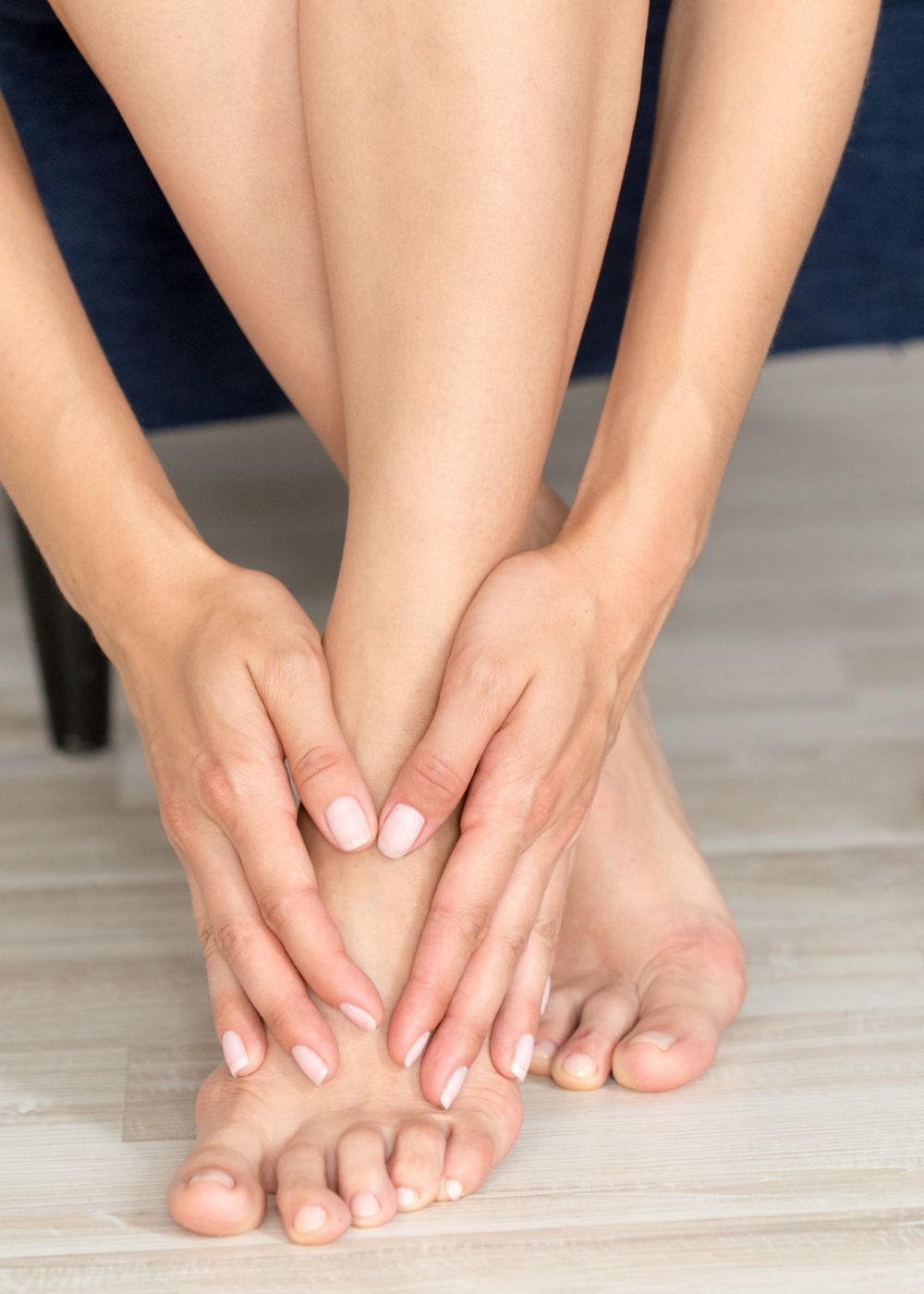Foot Odor and Smelly Feet
in New York City
Foot Odor (Bromodosis)
Smelly feet, medically referred to as Bromodosis, is an extremely common medical condition. The feet and hands contain more sweat glands than any other part of the body (about 3,000 glands per square inch).
Feet smell for two reasons: you wear shoes, and your feet sweat. The interaction between your perspiration and the bacteria that naturally live on your skin and thrive in your shoes and socks generates the odor. So, any attempt to reduce foot odor has to address both your sweating and your footwear.
Causes

What Causes Smelly Feet?
Besides the reasons above, smelly feet can be caused by an inherited condition called hyperhidrosis, or excessive sweating, which primarily affects men. Stress, some medications, fluid intake, and hormonal changes can increase the amount of perspiration your body produces and lead to more significant foot odor.
In diagnosing hyperhidrosis, it’s first important for your podiatrist to take a thorough medical history. Often, your podiatrist will run lab tests to see if your excessive sweating is the result of another medical condition, such as an overly active thyroid (hyperthyroidism) or low blood sugar (hypoglycemia).
Call Chelsea Foot and Ankle at (646) 929-4149 in New York City for Food Odor and Smelly Feet treatment.
How Can I Treat Foot Odor?
One of the easiest ways to control foot odor is to keep your feet clean and neat. This means using a mild soap and scrub brush to wash your feet at least once a day. As important as it is to wash and scrub your feet, it’s equally important to dry your feet completely after washing them, paying extra special attention to drying between all of your toes.
It’s also very important to regularly trim your toenails as the debris that can collect underneath them is loaded with odor-producing bacteria and fungi.
It’s imperative that you change your socks at least once a day, but in a hot environment, when exercising, or when your feet may become more sweaty, change them more frequently. Wet socks become a breeding ground for odor-producing bacteria. When wearing socks, choose moisture-absorbing materials like those made of natural fibers or moisture-wicking sports socks.
It’s also very helpful to alternate the shoes you wear from day to day. This allows each pair to fully dry out from the sweat and moisture that remain after a long day of wearing your shoes. If your shoes have removable inner soles, taking them out and allowing them to air-dry more thoroughly can help prevent moisture accumulation.
When the insides of your shoes are damp, they allow bacteria to grow on your feet more often. Sometimes, using an antifungal foot spray on the insides of your shoes or even an unscented Lysol brand air freshener will help to kill any bacteria that are surviving on the insides of your shoes and their inner soles. Be sure to allow these to thoroughly dry after spraying before putting them back on.
Wearing open-toe shoes and sandals during hot and humid weather and going barefoot indoors when it’s appropriate allows your feet to stay dry and helps to control the development of foot odor.
Why Choose
Chelsea Foot and Ankle?
To us, our patients and our team are family, and you can expect to be treated like the VIP you are. We respect you and your time and are committed to improving your quality of life by offering comprehensive services at reasonable prices customized to meet your needs.
Our doctors handle your treatment every step of the way — patients are never handed off to nurses or medical assistants. Dr. Ethan J. Climent has extensive experience in various podiatry issues, including bromodosis and hyperhidrosis, and treats each patient with personalized care and compassion.
What Medications Treat Hyperhidrosis?
- Prescription antiperspirants. Your podiatrist may prescribe an antiperspirant with aluminum chloride (Drysol, Xerac Ac). It’s usually applied to the affected skin before you go to bed. You wash the product off first thing in the morning when you get up, taking care not to get any of it in your eyes as this product can cause significant skin and eye irritation. If your skin becomes irritated, tell your podiatrist, as a hydrocortisone cream might help.
- Prescription creams. Prescription creams that contain glycopyrrolate may help hyperhidrosis that affects the face and head, but they are not as effective in the foot.
- Nerve-blocking medications. Some oral medications block the chemicals that permit certain nerves to communicate with each other. This can reduce sweating in some people. Possible side effects include dry mouth, blurred vision, and bladder problems.
- Antidepressants. Some medications used for depression can also decrease sweating. In addition, they may help decrease the anxiety that worsens the hyperhidrosis.
- Botulinum toxin injections. Treatment with botulinum toxin (Botox, Myobloc, others) temporarily blocks the nerves that cause sweating. Your skin will be iced or anesthetized first. Each affected area of your body will need several injections. The effects last six to 12 months, and then the treatment needs to be repeated. This treatment can be painful, and some people experience temporary muscle weakness in the treated area.
And even if your sweating improves after treatment, it may recur.
How Else Can You Treat Hyperhidrosis?
Other hyperhidrosis treatments include microwave therapy and sweat gland removal, but these are typically done in other areas of the body and are not used in the feet. In severe cases that do not respond to the above treatments, many patients opt to have a sympathectomy. During this surgical procedure, a surgeon cuts, burns, or clamps the spinal nerves that control sweating in your hands or feet. In some cases, this procedure triggers excessive sweating in other areas of your body (compensatory sweating). Surgery is generally not an option for isolated head and neck sweating. A variation in this procedure interrupts the nerve signals without removing the sympathetic nerve (sympathectomy).
Treatment

Central New York City Foot Odor Treatment
The doctors at Chelsea Foot and Ankle have your best interest in mind and treat each patient with personalized care. From bromodosis to hyperhidrosis, Dr. Ciment will get to the bottom of your foot odor concerns.
We also treat the following concerns:
And more!
Foot Odor and Smelly Feet FAQ
Do essential oils work for smelly feet?
It depends on the severity of your condition and the specific properties of the essential oil. Some essential oils, like Eucalyptus oil, have antibacterial properties, which can help minimize bacteria that cause smelly feet. However, most essential oils should not be put directly onto the skin. If you have mild foot odor, sprinkling some Eucalyptus oil onto the soles of your shoes after use may help with scent, but always check with your podiatrist before attempting DIY treatments.
What are the risks of untreated hyperhidrosis and foot odor?
The most common problem associated with foot odor and hyperhidrosis is usually psychological. Suffering from smelly feet and excessive sweating can be embarrassing and affect self-confidence. Excess moisture makes you more susceptible to fungal infections, which can be uncomfortable.
When should I see a podiatrist for foot odor and excessive sweating?
If your feet sweat excessively, you should see your podiatrist. Most patients find this condition embarrassing or not worth the appointment — but that couldn’t be further from the truth. Visiting your podiatrist can give you the answers you’ve been looking for — and with a tailored treatment plan, the freedom to live free of foot odor.
What can I expect from a bromodosis or hyperhidrosis examination?
These examinations usually come from patient testimony and descriptions of their condition. Because hyperhidrosis can be a secondary condition stemming from a primary issue, a complete medical history is needed to determine the cause. If your podiatrist concludes the condition is secondary, the primary condition is the initial focus. If your hyperhidrosis is considered primary, then Dr. Ciment will determine the best course of action for the above treatments.
Are you interested in treating Foot Odor and Smelly Feet?
If you need relief from foot odor and smelly feet in central New York City, call our office today at (646) 929-4149! Don’t forget to check out our blog and patient testimonials to learn more about us!
We always put our best foot forward…so you can too!
Our Patients Love Us
An absolutely amazing experience. Dr. Ciment is an absolutely wonderful person – it is very evident that he truly cares about his patients.
What a pleasure to meet Dr. Shastri. She was extremely personable, listened intently and actually was able to treat my condition to a fair extent in the first sitting.
Highly recommend her.
